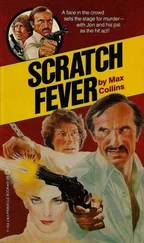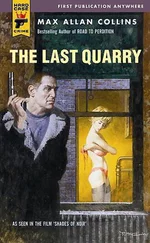Max Collins - Blood and Thunder
Здесь есть возможность читать онлайн «Max Collins - Blood and Thunder» весь текст электронной книги совершенно бесплатно (целиком полную версию без сокращений). В некоторых случаях можно слушать аудио, скачать через торрент в формате fb2 и присутствует краткое содержание. Жанр: Криминальный детектив, на английском языке. Описание произведения, (предисловие) а так же отзывы посетителей доступны на портале библиотеки ЛибКат.
- Название:Blood and Thunder
- Автор:
- Жанр:
- Год:неизвестен
- ISBN:нет данных
- Рейтинг книги:5 / 5. Голосов: 1
-
Избранное:Добавить в избранное
- Отзывы:
-
Ваша оценка:
- 100
- 1
- 2
- 3
- 4
- 5
Blood and Thunder: краткое содержание, описание и аннотация
Предлагаем к чтению аннотацию, описание, краткое содержание или предисловие (зависит от того, что написал сам автор книги «Blood and Thunder»). Если вы не нашли необходимую информацию о книге — напишите в комментариях, мы постараемся отыскать её.
Blood and Thunder — читать онлайн бесплатно полную книгу (весь текст) целиком
Ниже представлен текст книги, разбитый по страницам. Система сохранения места последней прочитанной страницы, позволяет с удобством читать онлайн бесплатно книгу «Blood and Thunder», без необходимости каждый раз заново искать на чём Вы остановились. Поставьте закладку, и сможете в любой момент перейти на страницу, на которой закончили чтение.
Интервал:
Закладка:
If I hadn’t been banging his girlfriend, and taking $250 a day from him for the pleasure, this is where I would have made a smart remark.
“Run along ’bout your bizness, now. On the way out, ask Seymour for your Bureau of Criminal ’vestigation badge, and the car keys.”
“What car keys?”
“I sent for an unmarked B.C.I. buggy for ya to use while you’re workin’ for me.”
So I’d driven down from Shreveport this morning, in a big black Buick that made me feel like a gangster (not an unusual outlook for a Huey Long bodyguard, really), following State Highway 20 along the Red River. I knew I was in the Pelican State because the highway signs bore an ungainly cartoon version of the bird. The road rolled by rich farmland and eerie wilderness alike, giving me glimpses of sprawling antebellum-style cotton plantations, as well as swampy expanses with willows, cottonwood and cypress trees. At Alexandria I picked up US Highway 71, swinging south, away from the Red River and into wooded bottomland, where truck farms, cotton and sugar-cane fields and uncultivated fields were alive with the colors of wild flowers.
I arrived in Baton Rouge, two hundred miles of Louisiana the wiser, with a solid sense of just how big a fish out of water I was, here.
And you know what pelicans do with fish.
The sixth floor of the Reymond Building did not look like an enemy encampment: gray-and-black speckled marble floor; dark-wood-and-pebbled-glass offices; names of attorneys, doctors and insurance agents in block-letter respectability on the frosty glass. No barbed wire or armed sentries in sight.
And on guard in Edward Hamilton’s outer office was a schoolmarmish matronly secretary who interrupted her typing to note my arrival and my business card, and announced my presence by intercom.
My card, incidentally, said “Hal Davis- Chicago Daily News.” I had taken half a dozen of these out of Hal’s billfold, a few months back, when he’d drunk himself to sleep on the bar next to me at my friend Barney Ross’s joint.
“Mr. Hamilton is expecting you,” she said, and parceled out a smile before returning to her work.
And he was expecting me: I had called from the hotel this morning, before I left Shreveport. I’d had no trouble getting in: I said I’d traveled South to “get the truth” about “Dictator Long” for my paper.
While I hadn’t spoken to Hamilton personally, but rather this matronly secretary, she had passed my message along to him, coming back almost immediately with an afternoon appointment.
Now he was rising from behind his desk, extending his hand, a white-haired, dark-eyebrowed and-mustached, medium-sized man in a well-tailored gray three-piece suit and blue tie that suggested both dignity and prosperity. His handsome face had a lived-in look, and the easiness of his smile was offset by deep-socketed sorrowful gray eyes that had seen way too much in half a century or so.
“I’m pleased to see you, Mr. Davis,” Hamilton said, in a mellow, Southernly soothing but quietly commanding baritone that must have served him well in a courtroom.
“My pleasure, Mr. Hamilton,” I said as we shook hands. “Thanks for seeing me at such short notice.”
A chair opposite him was waiting, and I took it.
I had glimpsed a sizable law library off the reception area, but Hamilton’s own office was modest, though that mahogany desk must have cost a small fortune. Vintage prints of riverboats, a signed photo of FDR and a few diplomas were the sole wall decorations; a couple of file cabinets were against a side wall. On his desk were a few framed photos, facing away from me; family photos, no doubt. One of them would be of his wife, Mildred-organizer of the anti-Long Women’s Committee of Louisiana.
I knew, from what Alice Jean had told me, that Hamilton had been special counsel to two state boards, patronage appointments from the previous administration, before the Kingfish had fired him, and battle lines had been drawn between them ever since.
I didn’t even have to ask a question: Hamilton was ready, willing and eager to speak his anti-Long piece.
“If you in the North think Huey Long is a peculiarly Southern phenomenon, Mr. Davis, you may soon learn how sadly mistaken you are.” He was sitting in a swivel chair and he rocked back easily in it as he spoke; his smile was gentle, his eyes hard, “First of all, the ‘Kingfish’ is no clown…. The Northern papers take that rustic-fool facade entirely too lightly, too lit’rally.”
I shrugged. “Makes good copy.”
“It makes good sense for Huey to sugarcoat his tyranny.”
“‘Tyranny’ is a pretty strong word, Mr. Hamilton.”
His smile stayed gentle, amused; and his speech remained softly Southern in cadence. But the words themselves were harsh.
“Make no mistake, Mr. Davis,” he said. “The Kingfish is an American Mussolini, a home-grown Hitler…a queer mixture of Fascism, baloney and old-fashioned bossism, Tammany Hall-style.”
That seemed a little overstated to me, but I merely nodded, and made notes.
“Louisiana under Huey P. Long,” the attorney continued, “is a banana republic with a particularly odious, megalomaniacal dictator. He owns the state government, the governor, the state university, the treasury, the state buildings and the Louisianians inside ’em. With a few isolated exceptions-my friend Judge Pavy, for one-Long owns the courts, as well. His secret police terrorize, and kidnap at will-”
I raised my pen as I interrupted. “My understanding is that Huey won his last election, handily. And that his candidates for other offices are usually big winners, too-”
Hamilton’s sorrowful eyes flared with anger. “He runs the elections, he counts the votes! He wields life-and-death power over private business, through his bank examiners, his homestead agents, his boards and commissions….”
“Is that why a law-abiding citizen, like yourself, took up arms and rose up against him?”
I was referring to uprisings in both New Orleans and Baton Rouge.
Last year in New Orleans, Huey-at odds with local politicians-had passed legislation giving the state (i.e., himself) control over the New Orleans police and fire departments; and usurped the city’s authority over voter registration and election machinery, as well. Huey had Governor O.K. Allen declare martial law, and soon the New Orleans police and an “army” of local citizens were facing down the National Guard. The comic opera situation had attracted both the national press and the White House, and-eventually-civic leaders had convinced both sides of the conflict to declare an armistice.
But the Baton Rouge uprising, earlier this year, had been the work of Hamilton’s Square Dealers. The group consisted largely of embittered Standard Oil employees who feared Huey’s personal war on Standard would drive out the company that kept the community financially afloat.
“Armed insurrection was not our goal,” Hamilton said quietly, the rocking in his swivel chair ceasing. “Only to rid the state of obnoxious dictatorial laws.”
I gave him a smirk. “Come on now, Mr. Hamilton. You wore little blue uniforms, you formed ‘battalions,’ you marched and drilled….”
His frown turned his dark eyebrows into one straight, furrowed line. “We were a paramilitary organization. So are the Boy Scouts. Neither group is inherently violent.”
“Your slogan was ‘Direct Action.’ One of your members spoke openly about hanging Huey and his puppet governor and all the rubber-stamp legislators-”
He bit the words off: “It was not our purpose to assassinate or murder anybody. For God’s sake, man, we numbered two ex-governors among our membership, and the mayor of New Orleans.” He shook his head. “I must say, I’m disappointed with the tack you’re takin’, Mr. Davis. I’m not certain this interview should…”
Читать дальшеИнтервал:
Закладка:
Похожие книги на «Blood and Thunder»
Представляем Вашему вниманию похожие книги на «Blood and Thunder» списком для выбора. Мы отобрали схожую по названию и смыслу литературу в надежде предоставить читателям больше вариантов отыскать новые, интересные, ещё непрочитанные произведения.
Обсуждение, отзывы о книге «Blood and Thunder» и просто собственные мнения читателей. Оставьте ваши комментарии, напишите, что Вы думаете о произведении, его смысле или главных героях. Укажите что конкретно понравилось, а что нет, и почему Вы так считаете.











